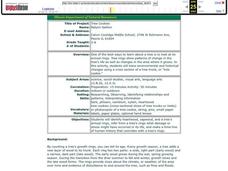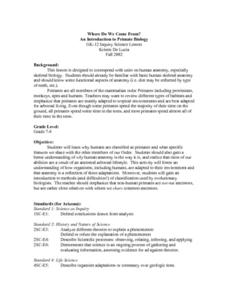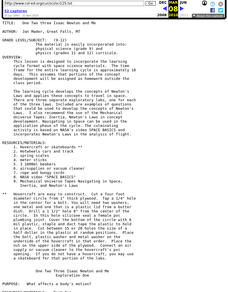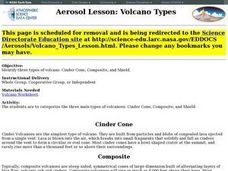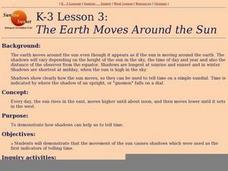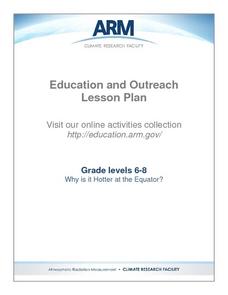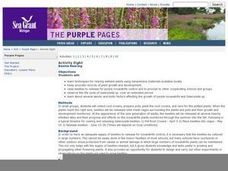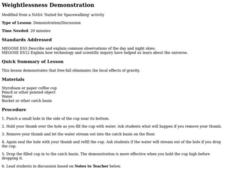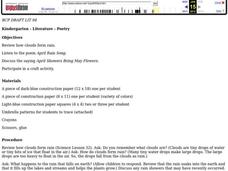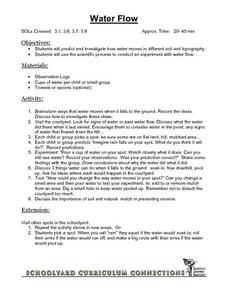Curated OER
Variations in Growth and Reproduction of Recently Transplanted Prairie Forbes and Grasses
students recognize and name prairie plants without the use of a key. they determine that prairie plants have different life cycles that affect their rate of growth and reproduction
Curated OER
Tree Cookies
Young scholars identify heartwood, sapwood, and a tree's annual rings, infer from a tree's rings what damage or stress might have occurred in its life, and make a time-line of human history that coincides with a tree's rings.
Curated OER
Where Do We Come From? An Introduction to Primate Biology
Seventh graders explore skeletal biology. Through a discussion and video observation, 7th graders investigate how the anatomy is adapted to the environment. Students study primates and explore their characteristics and behaviors.
Curated OER
One, Two, Three--Isaac Newton and Me
Students experiment to develop understanding of Newton's Laws and how they apply to space travel in this ten day instructional activity sequence.
Curated OER
Aerosol Lesson: Volcano Types
Middle schoolers identify three types of volcano: cinder cone, composite, and shield.
Curated OER
TAKING APART OWL PELLETS
Young scholars dissect and owl pellet and then reconstruct small rodents on a presentation board using a textbook picture as a guide.
Curated OER
Bernoulli's Principle Lab
Students are introduced Bernoulli's Principle and how it shows the relationship between fluid speed and pressure change. In groups, they participate in experiments in different processes in the industrial world. They share their...
Curated OER
There's a Volcano in my Backyard!
Students utilizing a volcanic hazard map of Mount Rainier, reach conclusions about the potential hazards of future eruptions. They create educational materials about these hazards and what to do if one erupts again in the future.
Curated OER
Amazon Water Cycle Role Play
Students participate in a role play where they play clouds, the ocean, rain drops, and more in order to learn about the water cycle. In this water cycle lesson plan, students have discussions and learn vocabulary.
Curated OER
Eyewitness Accounts
Students use eyewitness accounts to gather and evaluate information about the events of the May 18, 1980, eruption of Mount St. Helens. They play the following roles: reporter(s), eyewitnesses, and scientists who are investigating the...
Curated OER
Biodiversity in Sixth Grade
Sixth graders explore the nature of habitats on an ABC hike. In groups, they collect items that make up habitats including plants, feathers, and leaves among other materials. Students then classify and organize the collected materials...
Curated OER
Shake, Rattle, and Roll
Students make an earthquake simulator and test their structure to see if it lasts through the earthquake. In this earthquake lesson plan, students make a structure and test and record the results from an earthquake simulator made out of...
Curated OER
The Earth Moves Around the Sun
Students demonstrate that the movement of the sun causes shadows which were used as the first indicators of telling time.
Curated OER
Why Is It Hotter At the Equator?
Students investigate the different heating effects of sunlight. They conduct an experiment that demonstrates the way sunlight strikes the equator, the poles and other parts of the globe.
Curated OER
Beetle Rearing
Students investigate plants and the effects beetles have on the plants. In small groups, they collect plants and observe the beetles as they interact with the plants. They record the conditions including temperature, cloudiness, length...
Curated OER
Tracking Ocean Ecology
Students look at the data maps given to them about how chlorophyll affects the algae blooms and make predictions about the harm they will cause. In this data maps lesson plan, students manipulate data sets from the website.
Curated OER
Biochemical Cycles
When learning about several different processes at a time, it can be difficult to differentiate between them. In the resource found here, you can see what your kids know about some of Earth's systems including the carbon, hydrologic,...
Curated OER
What Goes Up Must Come Down!
Students hypothesize about the nature of falling objects, design an experimental test to answer the question using everyday objects, analyze data to form conclusions, and infer that mass does not affect the speed of falling objects. This...
Curated OER
Make a Paper Helicopter
In this paper helicopter worksheet, students follow a set of directions to make a helicopter. Page includes 4 "challenge" activities/suggestions.
Curated OER
Domino Dash
Eighth graders examine the relationship between speed, time and distance. In this motion lesson students complete a lab activity that allows them to calculate average speed.
Curated OER
Weightlessness Demonstration
Students investigate gravity. In this weightless lesson students complete a lab activity about how a free fall might effect how one perceives gravity.
Curated OER
Poetry
Students review how clouds form rain, listen to the poem April Rain Song, discuss the saying April Showers Bring May Flowers, and participate in a craft activity.
Curated OER
Environment: Water Flow
Students brainstorm the ways that water flows when it falls to the ground. After discussing three things water can do, they investigate and predict water movement outdoors on school grounds. They experiment ways to alter the water flow...
Curated OER
Hang Time
Learners discuss how all objects fall at the same rate and vertical motion is independent of the horizontal motion. Students apply this information to center of mass activities before solving equations.



